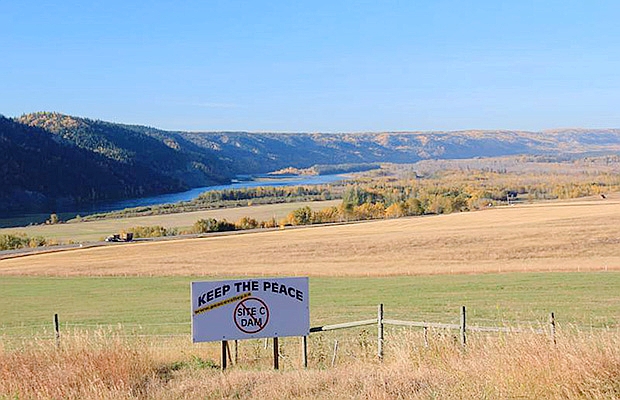Like this article? rabble is reader-supported journalism. Chip in to keep stories like these coming.
The Northern First Nations Leadership Alliance has called on incoming Prime Minister Justin Trudeau to reject the Site C dam. As noted in their media release, “The Alliance has agreed to initially focus on the proposed Site C dam project and the deeply failed approaches to consultation with First Nations in regard to this project.”
Site C is a 60-metre high, 1,050-metre-long earth-filled dam and hydroelectric generation station being built on the Peace River between the communities of Hudson’s Hope and Taylor in northeastern British Columbia. It will create an 83-kilometre-long reservoir and flood about 5,550 hectares of agricultural land southwest of Fort St. John. It will also submerge 78 First Nations heritage sites, including burial grounds and places of cultural and spiritual significance. Much of the power will go to environmentally destructive projects like fracking in British Columbia, which in turn is used to fuel the extraction of bitumen from the tar sands. It has been estimated that the Site C dam could emit 150,000 tonnes of greenhouse gas emissions a year, the equivalent of adding 27,000 cars on the road.
The Council of Canadians began speaking against the proposed dam in March 2010.
On October 14, 2014, the Harper government and the Christy Clark government in British Columbia both approved the dam. On that day, the federal minister of the environment Leona Aglukkaq stated, “I determined that the Designated Project is likely to cause significant adverse environmental effects [but that they] are justified in the circumstances.”
In yesterday’s media release, Chief Roland Willson of the West Moberly First Nation says, “Canada has an opportunity to become a leader in alternative energy development. I am calling on our new Prime Minister to work with us in developing Canada’s potential to be a global leader in this field, instead of pursuing archaic approaches like the Site C dam. The era of destroying rivers should be over.”
The dam is opposed by 23 First Nations across British Columbia, Alberta, and the Northwest Territories. Four years ago five First Nations asked the United Nations to defend their rights under the UN Declaration on the Rights of Indigenous Peoples against this project. Treaty 8 First Nations, including the West Moberly First Nation, have Title to the Peace River Valley and the Supreme Court of Canada decision on the Tsilhqot’in Title case means their consent for this project is needed.
Chief Lynette Tsakoza of the Prophet River First Nation highlights, “Our new Prime Minister has committed to the United Nations Declaration in regard to ‘free, prior and informed consent.’ This must become the foundation of a new approach to consultations with First Nations, one that results in positive outcomes for our communities, and for Canada.”
The Northern First Nations Leadership Alliance has asked Trudeau to begin discussions on these issues with them.
Construction for the dam began two months ago, but the dam is not expected to be operational until 2024.
Like this article? rabble is reader-supported journalism. Chip in to keep stories like these coming.



